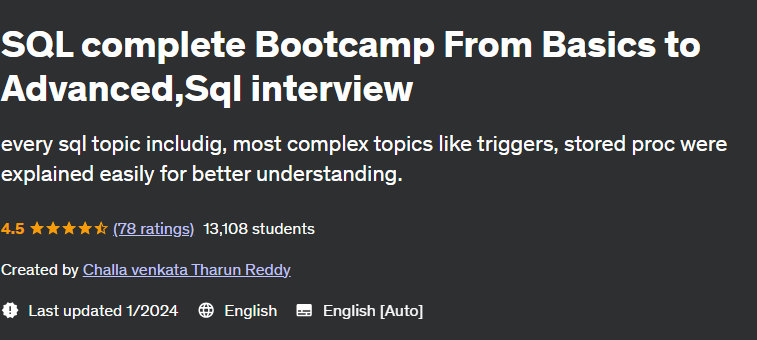Description
Complete SQL course Bootcamp From Basics to Advanced Sql interview. Why SQL?
- Store a large number of records
- Share huge data sets with many people
- Add and edit data easily
- Find information quickly and easily
- RDBMS terminology
- Column as attribute
- row as entity instance
- Table as entity
- AlternateKey as UniqueKey
- Cardinality relations
- 90% of tables in a database are linked to other tables.
- 10% of tables will be independent.
- There are three types of relationships between tables
- one by one
- one to many
- Many many
- Tables can have one or more relationships or they can have no relationships.
- Structured data – two-dimensional data of rows, columns
- PrimaryKey in one table is given as ForeignKey in another table to create relationship.
- Data modeling
- RDBMS
- PrimaryKey & ForeignKey with relationship between them.
- 1 to 1 – Any PrimaryKey can be converted to ForeignKey
- 1 to many employees in a department
- PK will be the parent table in the child table FK
- Deptid(PK),DeptName,
- Employee table Empid,EmpName,DeptId(FK)
- many many (students and teachers, patients and doctors, hospital and doctors) (TeacherId,TeacherName) (StudentId,StudentName,TeacherId)
- A new table is created and an additional column is added (bridge table).
- Patient table (patient number (PK), patient name, address),
- Table of doctors (DoctorNo(PK), name, qualification, salary, membership date, resignation date)
- patient doctor table ()
- SDLC software development life cycle
- Required
- Analysis and design
- Development
- Testing
- deliverance
- Domain Expert (SRS Documentation)
- the architect
- SQL developers
- Testers
- Developers (TL/Manager)
- ERD (Entity Relationship Diagram)
- Peter Chan – used for database design
- Referential integrity
- SQL Server performs an existence check when we create a relationship.
- Self-referencing tables
- A table that contains both PrimaryKey and ForiegnKey, and ForiegnKey refers to the primary key in the same table.
- You are going to learn
- Commands (DDL, DML, DQL, DCL, TCL)
- Data types
- Limitations
- Limitations
- vacant
- Assumption
- PrimaryKey
- UniqueKey
- foreign key
- Check
- Auto increase
- opinions
- Operators
- Write query
- Joins
- Subquery
- Derived table
- Visits
- Indicators
- Stored procedures
- Triggers
- Function
- Markers
What you will learn in SQL complete Bootcamp From Basics to Advanced Sql interview course
-
Learn how to install mysql desktop
-
Learn how to work with mysql commands
-
Learn how data is stored and modified in SQL
-
Provides thorough knowledge of all sql database objects
-
Data analysis, data engineering, data science, database development
Complete SQL Bootcamp From Basics to Advanced Sql interview course is suitable for people who
- A beginner who wants to learn mysql completely
- SQL for professional learners and active professionals and developers
SQL Full Bootcamp From Basics to Advanced Sql interview course specifications
- Publisher: Udemy
- teacher: Challa Venkata Tharun Reddy
- Training level: beginner to advanced
- Training duration: 19 hours and 47 minutes
- Number of courses: 30
Course headings
Prerequisites of SQL complete Bootcamp course From Basics to Advanced Sql interview
- No programming knowledge required, learner must have a laptop/computer to practice
- Completely for beginners to make you an expert.
Course images
Sample video of the course
Installation guide
After Extract, view with your favorite Player.
Subtitle: None
Quality: 720p
download link
File(s) password: www.downloadly.ir
Size
5.1 GB
